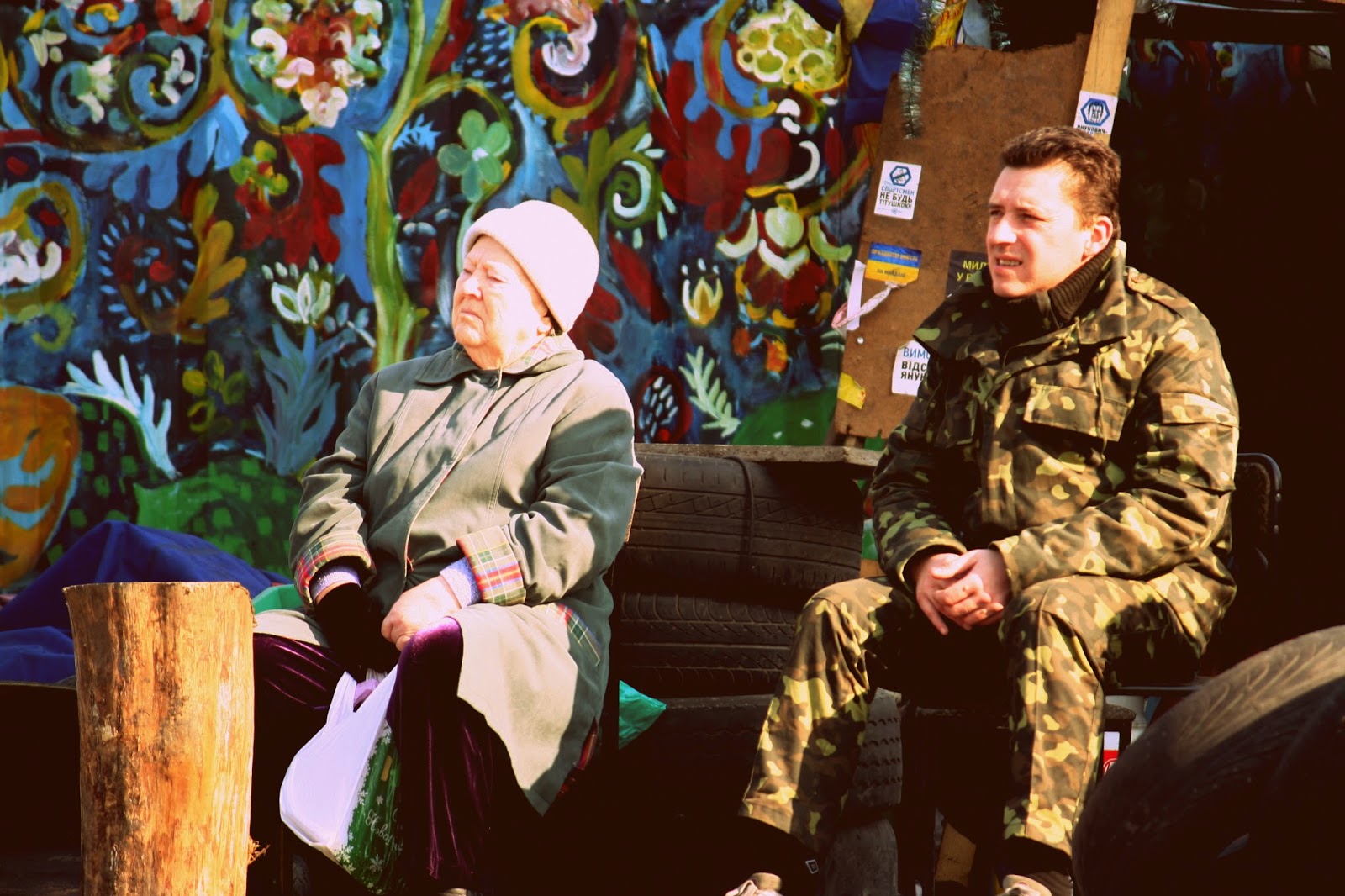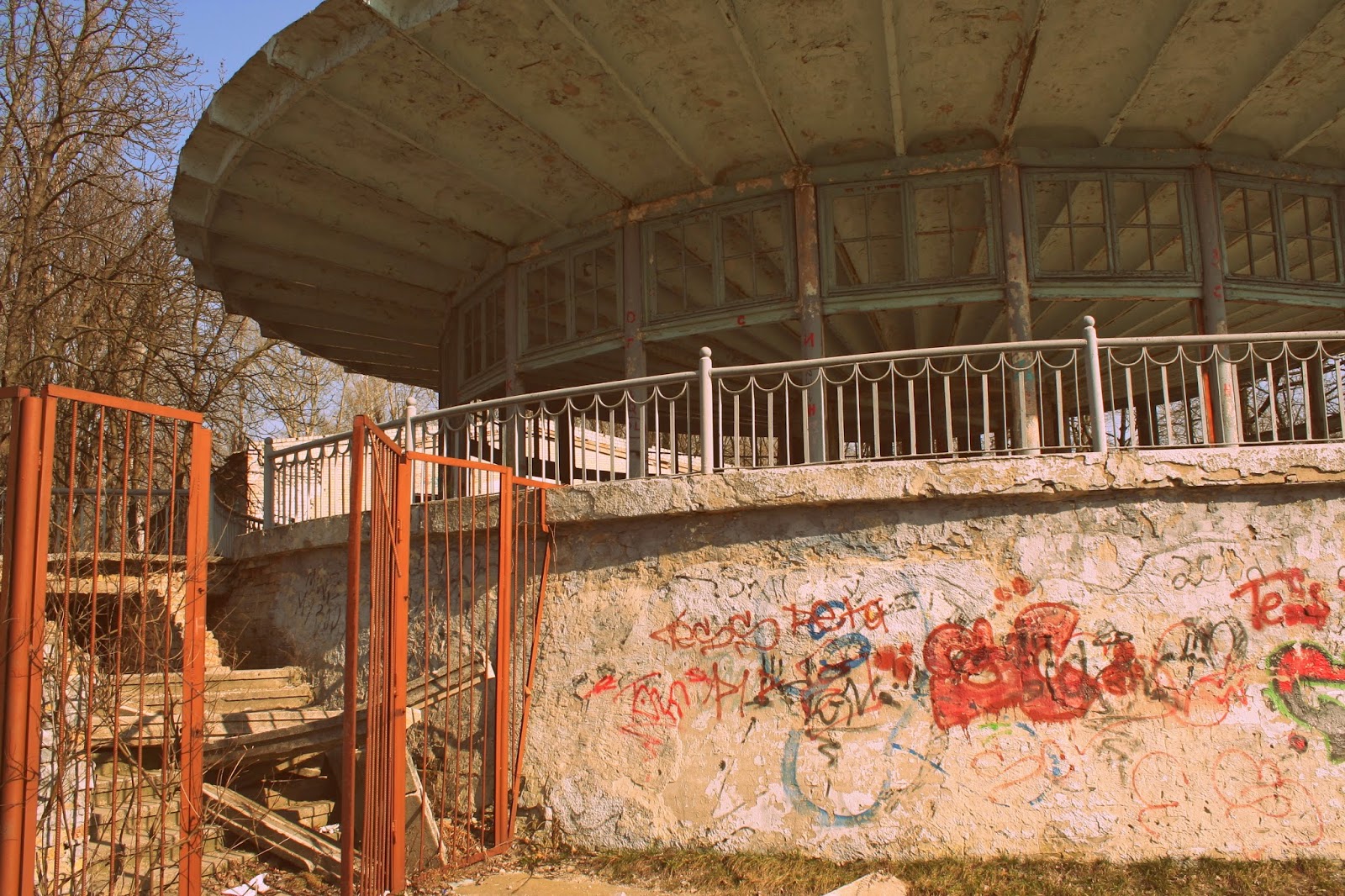In the end nobody cares for the people
When the demonstrations started on Maidan in Kiew in the middle of November 2013 I pretty much thought "another country affected by the possibility to organise and spread information quickly through social media and which wants to change their corrupt leader...". So the Maidan kept popping up in the news and at some point became a focus of global media when anti-riot units of the police, especially the Berkut, reacted to the protestants with an escalation of violence. The following weeks Kiew was taken and a new government was established by the parties which represented Maidan.
I thought the revolution was over and Ukraine could start to work on their problems in economy, society and cultural diversity which are severe (Ukraine is actually worse of today than after the collapse of the Soviet Union). This is the moment when Putin reacted and I do not want to repeat everything that happened but basically started claiming areas in the east of Ukraine. My first intuition was that he cannot succeed against the people and after Maidan they will rise against this occupation. Well they did rise, but in favour of Russia to take even more territory than Crimea. Much to my surprise I must admit.
I was so baffled, even after I heard about Ethnic-Russians populating the east of Ukraine, that they would rather live under the governance of the Kreml than a pro-western governemnt in Kiew. So I decided to fly to Kiew and make my way from there towards east into the province Donbas at the Russian border.
When I landed in Kiew I did not know what to expect, the riots were over and still there was tension in the city. I took the bus to the city and it did not take a long time when I saw improvised checkpoints with tires and lose bricks at the roads entering the city; all of them organised by "civilians" and most of them showing the Ukrainian and European flag. I thought of it as a positive sign and felt happy to see people so eager to join the EU but also it left an odd feeling of uncertainty and in a way represented that things are still far from normal.
Once one entered the city it did not feel much different from any other metropolis, crowded public transportation, busy streets really nothing special but when I got off at my stop in the city center where my hostel was situated and steped out of the building I was stunned. People were acually getting upset with me for standing right in the doorway of the train station and just trying to comprehend the image which presented itself in front of me.
A sea of piles of lose bricks taken from the pavements and used as blockades, Ukrainian flags and all sorts of others waving in the wind, men in military uniforms in front of tents wearing helmets and some kind of often selfproduced weapons and in the middle of this just normal people passing through on their way to work or just taking a walk. It looked like war but the atmosphere was very peaceful. I dropped off my bags and immediately went back to Maidan just to walk between the tents and get a feeling for what moves the people here. I was truely amazed by how many normal civilians passed trough there as well, despite the fact that Maidan is the city center and one has to pass through it at some point but it was more than that. People came to see what happened here, they talked to the fighters, brought food or clothing, laid down flowers for the victims, were chanting songs together or were listening to the priest during his service. The Maidan has become a symbol for change and more, a cultural centrum for a new society.
 |
| Maidan |
 |
Listening to a Speach on Maidan
|
It was curious to see how still so many lived in their tents on Maidan and kept the feeling of revolution alive but when I was wandering a little bit further outside of the city center I saw more of the Ukraine culture besides Maidan. When I was walking through a park and saw people walking their dogs or sitting next to the river talking, everything went very quiet. Here the mood had changed, not as optmistic as I experienced in the center. One felt the difficulties that have yet to be solved in this country. Wild dogs living in abandoned cafes that were built for the time when the European Championship in soccer was hosted by Ukraine and Poland, old men sitting in shaky plastic chairs and young couples walking along the river. To be honest all of this felt more real than Maidan but it was also way more depressing. This is when I realized that sustainable change has to happen in this country and I understood Maidan's popularity a little bit more.
 |
| Abandoned Cafe a little bit further outside from Kiew Centrum |
 |
| Beach at the River with view on thePeople's Friendship Arch |
After two days in the west I left for a 12 hours train ride to the east heading to the province capital Donetsk, a city with about 1,1 million citizens and 100 km from the Russian border. I heard about pro-Russia movements and conflicts between Ukrainian supporters and them. In fact the night before I arrived a young man was stabbed, therefore tensions were high and I was nervous since I have also heard how western journalist and media representatives were treated in Simferopol.
The first hours I spent walking the city looking for signs of the conflict and could not find any except the large number of riot policemen guarding public buildings and I also recognized one mature difference to the west, everyone was talking Russian on the streets. Then I observed more and more people wearing orange and black striped ribbons (Similar to the ones used in Kiew in blue and yellow) on my way to the Lenin square where I suspected the pro-Russians. When I finally arrived at Lenin square it took me by surprise to see a large manifestation with speaches, press tents and lots of chanting people. All in favour of Russia. I moved within the crowed to take some pictures but could already tell that the people's mindset was not overly friendly towards English speaking people so I decided to best say nothing anymore and just observe. It was a strange feeling though getting off a train in the same country and experience a world that could not have been more contradictory to Maidan in Kiew.
 |
| Lenin Sqaure |
In the course of the day I got to know Aleks a young pro-Russian demonstrator who talked English and was willing to give me some information about the reasons and fears of the people taking part in the demonstration. We ended up having pizza and talked politics for a long time. I slowly started to understand that this is not simply a well organised Kreml event but that there are actual people who want to join Russia rather than stay in Ukraine, and not only a few.
 |
| Rally to the courthouse to request release of Guberov (Pro Russian Leader) |
 |
| Riot police tries to protect public buildings |
Some of his arguments were strongly biased against western media and pretty much represented what Russia is publishing over the statemedia the last couple weeks but some things were new and helped me to comprehend. One of these arguments was the reason why they call the new government and Maidan movement fascists. He explained that many of the people who fought against Berkut and the police in Kiew are neo-nationalists who strongly relate to the Nazi supporters during the second World War. Thinking back at the time I have spent at Maidan I had to admit that a vast majority of the people still camping there looked rather pro-military and had insignias which strongly reminded me of neo-nationalists in other countries. I felt like I might have been tricked by the scenerie of flowers and chanting on Maidan, but then again I thought that of the 50.000 poeple who participated at some point in the protests in Kiew not all of them could represent this particular mind-set he was describing. Nevertheless I did understand why the people here are afraid that those radical powers will be/are part of the temporary government in Kiew and that they fear for their safety. He also claims after the many stages of escalation he cannot imagine to live in Ukraine any more and that the only way for Donbas (Eastern province of Ukraine) is seperation or independence if all governments want to avoid a civil war. Beside ideological reasons Aleks also explained that he is afraid that the already weak economy of his country would not benfit from Europe but instead goods and products would be substituted by European imports and that this could also create an indirect problem for Russia as most of Ukraine's exports are delivered there, reducing Ukraine to nothing more but a transit zone.
 |
| Pro-Russian Demonstrator in Donetsk |
My impression after the time I spent on both sides is undecided. I am in favour of the revolution in general and believe in the honest motivation that stands behind Maidan, to fight corruption and connect to Europe more closely because we have seen in the past how soviet "left-overs" can benefit from closer economic relations with the Union, for example Poland.
On the other side the feeling to be disciminated against and oppressed by a "fascist" government in Kiew and losing their big brother Russia is not very realistic from my point of view but more comprehendable when observing from the position of someone who grew up in Donetsk. Russia has always been a part of their cultur, business and society. They have more faith in what Russian media tells them about the west, for them it feels pretentious that the west starts to care about them now after two decades of poverty and economic downturn in their country.
In my opinion it is very obvious that Russia is more concerned about their influence and position in the world than the people in Crimea or Donbas but they know how to play the emotions of the people living there. To us it sounds like superficial propaganda but given the historical background of ethnic-Russians it seems very plausible for them.
I am afraid that the only way the west could have prevented this from happening has already passed and the process of reunification of the Ukrainians will take years, if it will ever happen again. At this point I would guess that the Country will seperate since the west does not want to commit to yet another civil war, especially one so close to their own homes threatening their wealth. So it will probably will come down to the question: "How much do we benefit from Ukraine?" I am afraid this war of morals and international laws concerning autonomy and sovereignty will go just as far as it is profitable with eyes on the future returns of this "investment". Unfortunately it will be the people of Ukraine who have to bear the consequences of this conflict. A crisis fought on their backs but not about them.
For more Pictures visit my Facebook:
https://www.facebook.com/fabian.annich/photos_albums





















































